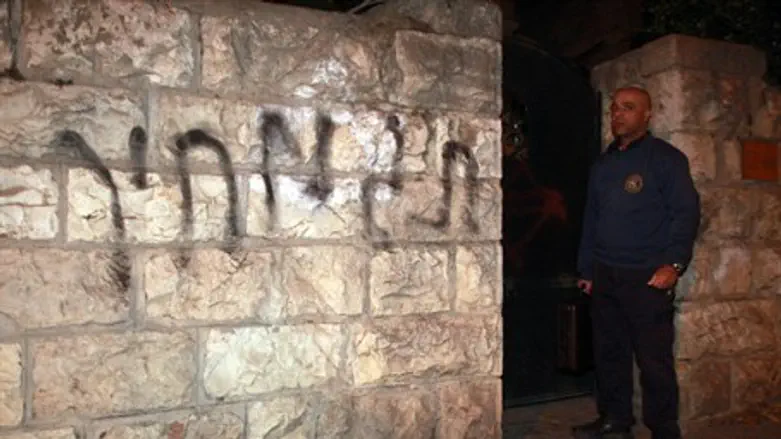
Jerusalem police said Sunday that they had investigated 56 complaints of “price tag” actions – but were able to follow through and make arrests in only 12 of them. The low resolution rate for cases, said observers, said that either police were ineffective in investigating these kinds of cases, or that many of the alleged “price tag” attacks were something else altogether – a good example being a “price tag” case in Samaria that recently turned out to be an instance of internal fighting in an Arab village.
“Price tag” attacks are usually directed at Arabs, and attributed to Jews, especially residents of Judea and Samaria and/or religious and right wing Jews. The attacks usually include graffiti scrawled on the wall of a store or mosque condemning Arabs, and often with a signature that reads “price tag.” Price tag incidents are usually a cause celebré in the media, which is quick to condemn the right wing, its educational system, rabbis, and lifestyle as being the cause of the attacks.
Because of the media attention, police usually allocate significant resources to finding price tag culprits – but in the 56 cases Jerusalem police investigated in 2012, arrests were made in only 12 of the cases. In 2011, only 28 such cases were reported.
Police said that they were opening a new department to deal with the attacks, to which ten officers would be specifically assigned. But right wing activists in Jerusalem and Judea and Samaria said that police may be looking in the wrong direction, if the events in the village of Kosra in Samaria are any indication. After residents discovered that six vehicles in the village near Shechem, residents and police immediately attributed the action to price tag actions by residents of nearby Esh Kodesh, a Jewish town outside Shechem. Leftist groups, including “Rabbis for Human Rights,” issued a harsh statement condemning Esh Kodesh residents for their “hateful” activities.
But police said last week that they had been wrong – and that Jews had nothing to do with this “price tag” attack. Police said that the “evidence” supplied by Arabs that Jews had undertaken the attack – an Israeli identity card left at the scene – was fabricated. The ID card belonged to a soldier who, on the night of the attack, was stationed far from the Arab village. He had apparently lost the ID card, with Arabs finding it and holding onto it, apparently for an event just like the one that occurred in the village.
“Price tag has become a good way to make Jews into a scapegoat for arguments Arabs have between themselves,” said one right-wing activist in Jerusalem. “If police would look beyond their prejudices and stereotypes and consider all the possibilities, they would probably be able to solve more of these cases.”